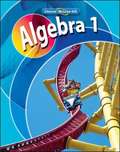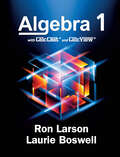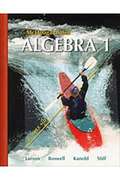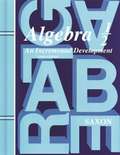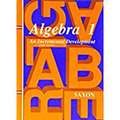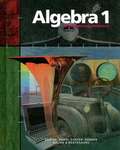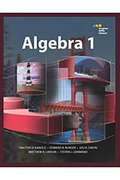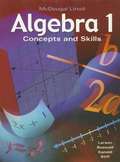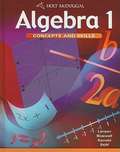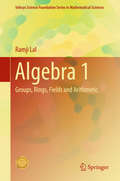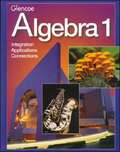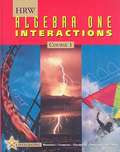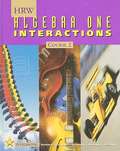- Table View
- List View
Algebra 1 for Christian Schools (2nd edition)
by Kathy D. Pilger Ron TagliapietraThe Arabic word al-jabr from which we get our word algebra carries the idea of the reunion of broken parts, such as the reduction of fractions to whole numbers. Algebra takes the fragmentary information of a word problem, symbolizes it in abstract form, and derives the answer. Algebra is a structured system for expressing and analyzing the relationships between quantities that may themselves be unknown. The resulting formulas, equations, and expressions are built from symbols, numbers, and operations. The power of algebra is seen when we determine an unknown quantity simply by manipulating the symbols. Algebra is a worthwhile study for all students. Even trades use computers or other tools that depend on algebra, and the most effective use of such tools requires an understanding of what it does. The study of a subject such as algebra requires diligent effort, but it provides either specific skills or practical background knowledge for every type of work. Furthermore, the diligent development of mental discipline has its own rewards
Algebra 1, Practice and Problem Solving Workbook
by Prentice HallThis book contains Algebra practice exercises and answers.
Algebra 1, Student Companion
by Prentice HallPrentice Hall Algebra 1 program is designed to help students achieve mastery of Algebra 1 topics.
Algebra 1, Third Edition
by Mark Wetzel Gene Bucholtz Tamera Knisely Larry HallAlgebra 1, Third Edition focuses on the integration of algebraic concepts in technology and real-life applications, presenting topics in logical order with detailed examples that promote student comprehension and retention. Students explore the simplification, solving, graphing and interpretation of linear, exponential, radical, quadratic, and rational functions both manually and with technology.
Algebra 1, Wisconsin, Student Edition
by Ron Larson Laurie Boswell Lee Stiff Timothy D. KanoldThe content of Algebra 1 is organized around families of functions, with special emphasis on linear and quadratic functions. As you study each family of functions, you will learn to represent them in multiple ways--as verbal descriptions, equations, tables, and graphs. You will also learn to model real-world situations using functions in order to solve problems arising from those situations. In addition to its algebra content, Algebra 1 includes lessons on probability and data analysis as well as numerous examples and exercises involving geometry. To help you prepare for standardized tests, Algebra 1 provides instruction and practice on standardized test questions in a variety of formats--multiple choice, short response, extended response, and so on.
Algebra 1/2: An Incremental Development (3rd Edition)
by John SaxonThe Algebra 1/2 course focuses on introductory algebra topics. It is designed to facilitate your transition from the concrete concepts of arithmetic to the abstract concepts of algebra. One feature of Algebra 1/2 that you will find particularly useful is the lesson reference numbers in the problem sets. Beneath each problem number in the problem sets is a number in parentheses; this number refers to the lesson where the concepts and skills required to solve the problem are introduced. Should you have difficulty solving a particular problem, refer to the appropriate lesson for assistance.
Algebra 1: All-in-One Student Workbook
by The Editors at the Pearson Prentice HallThis book is a complete workbook for students covering all the important topics in Algebra and extensive exercises.
Algebra 1: An Integrated Approach
by Mary Hansen Robert Gerver Richard Sgroi Claudia CarterAlgebra 1 textbook.
Algebra 1: An Integrated Approach
by Ron Larson Lee Stiff Timothy D. KanoldIntroductory textbook to algebra.
Algebra 1: Concepts And Skills (Math Detective Pilot Test) (Hmh Algebra 1 Ser.)
by Timothy D. Kanold Edward B. Burger Juli K. DixonNIMAC-sourced textbook
Algebra 1: Concepts and Skills
by Ron Larson Laurie Boswell Lee Stiff Timothy D. KanoldIn algebra, you can use letters to represent one or more numbers. When a letter is used to represent a range of numbers, it is called a variable. The numbers are called values of the variable.
Algebra 1: Concepts and Skills
by Ron Larson Laurie Boswell Timothy D. KanoldNIMAC-sourced textbook
Algebra 1: Concepts and Skills (South Carolina)
by Ron Larson Laurie Boswell Timothy D. KanoldNIMAC-sourced textbook
Algebra 1: Groups, Rings, Fields and Arithmetic (Infosys Science Foundation Series)
by Ramji LalThis is the first in a series of three volumes dealing with important topics in algebra. It offers an introduction to the foundations of mathematics together with the fundamental algebraic structures, namely groups, rings, fields, and arithmetic. Intended as a text for undergraduate and graduate students of mathematics, it discusses all major topics in algebra with numerous motivating illustrations and exercises to enable readers to acquire a good understanding of the basic algebraic structures, which they can then use to find the exact or the most realistic solutions to their problems.
Algebra 1: Integration - Applications - Connections
by Mcgraw-Hill StaffGlencoe's Algebra 1 and Algebra 2 balance sound skill and concept development with applications, connections, problem solving, critical thinking, and technology. Whether your students are getting ready for college or the workplace, this program gives them the skills they need for success.
Algebra 1: Interactions (Course 1 #1)
by Deirdre KennedyHere are some of the few topics covered in this book: data & patterns in algebra, patterns with integers, rational numbers & probability, geometry connections, addition & subtraction in algebra, multiplication & division in algebra, solving equations & inequalities, linear functions, systems of equations & inequalities, a preview of functions and much more.
Algebra 1: Interactions (Course 1 #2)
by Paul A. Kennedy James E. Schultz Irene Sam" Jovell Diane Mcgowan Kathy HollowellSome of the topics covered in this algebra book are: functions, equations, inequalities, matrices, probability, statistics, transformations, exponents, polynomials, factoring among others.
Algebra 1: Learning in Context
by Cord CommunicationsMany of the tools of today's technology--computer chips, lasers, and HDTV--were invented by people who are highly skilled in number sense and operations. As technology has become a major part of our everyday lives, these skills are in ever increasing demand.
